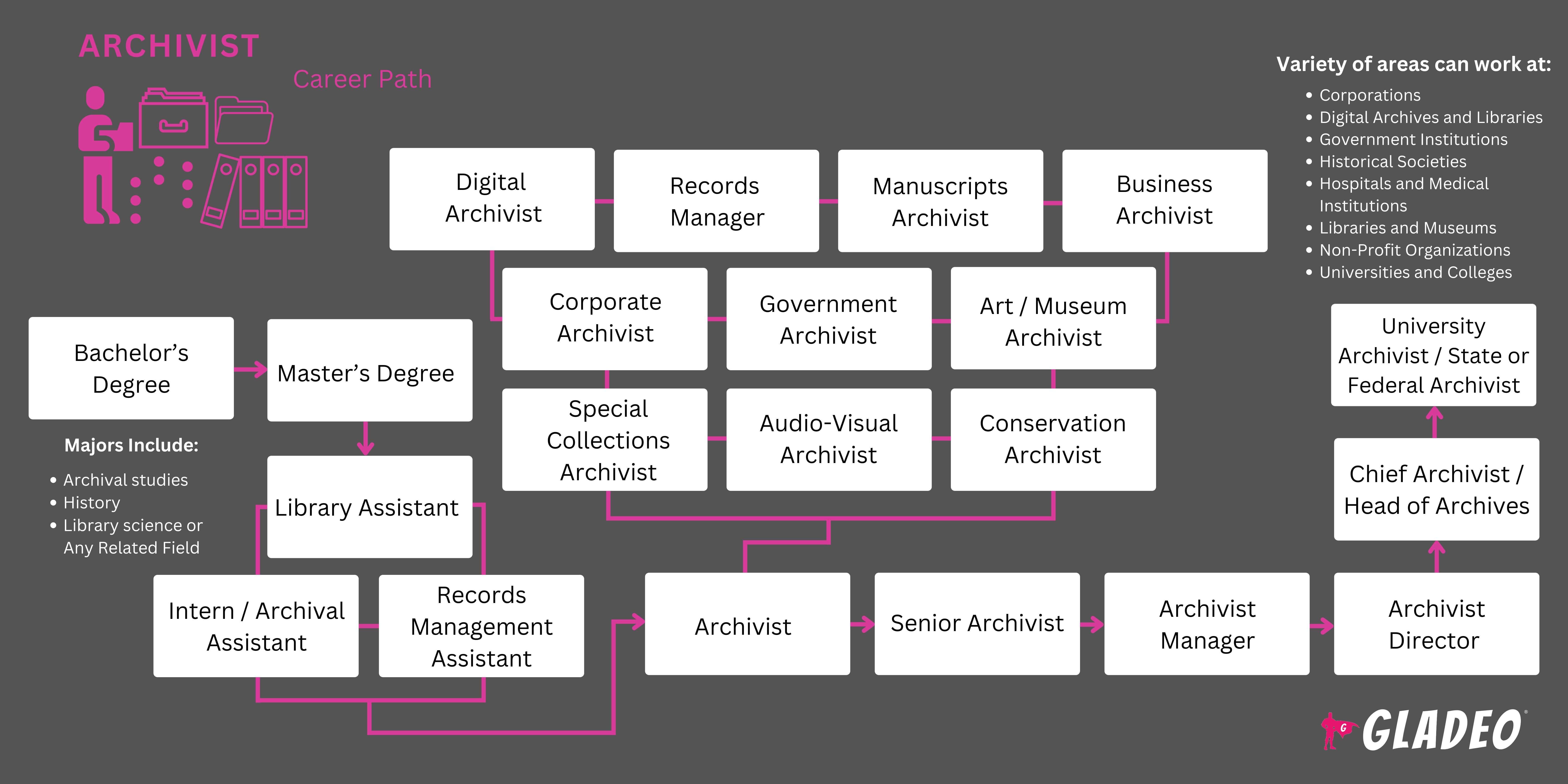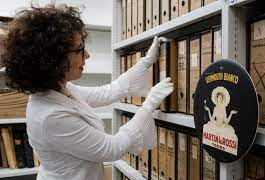Spotlights
Thư ký Hồ sơ Lưu trữ, Lưu trữ, Lưu trữ Phim, Lưu trữ Bảo tàng, Cơ quan đăng ký Bảo tàng, Giám đốc Hồ sơ, Lưu trữ Tham khảo, Nhà lưu trữ Nhà nước, Nhà lưu trữ Đại học
Every photo, document, and artifact in a museum or archive has a story—and Archivists are the guardians who make sure those stories are preserved and accessible for generations to come. Archivists collect, organize, describe, and protect historically significant materials, whether they’re centuries-old letters, audio recordings, government documents, or digital files. Their work ensures that researchers, students, historians, and the public can connect with the past in meaningful ways.
Archivists work in many different settings—museums, libraries, universities, government agencies, and private organizations. A typical day might involve cataloging and labeling items, carefully storing fragile materials, digitizing records, or helping researchers find what they need. Archivists also play an important role in deciding what’s worth keeping, evaluating the historical, legal, or cultural value of collections.
This is a career for people who love history, organization, and problem-solving. Archivists get to handle rare or valuable materials, protect them from damage, and make sure they’re preserved for the future. It’s quiet, focused work that requires attention to detail, patience, and a passion for storytelling through records and artifacts.
- Preserving history for future generations.
- Working closely with rare and unique collections.
- Supporting researchers, students, and the public in uncovering valuable stories.
- Contributing to cultural heritage and public knowledge.
- Playing a key role in protecting materials from loss or damage.
Lịch làm việc
- Archivists typically work full-time, Monday through Friday, in climate-controlled environments like libraries, archives, or museums. Occasionally, evening or weekend hours may be required during exhibitions, special events, or research projects.
Nhiệm vụ tiêu biểu
- Identify, collect, and organize archival materials.
- Catalog items and create detailed finding aids or databases.
- Preserve physical and digital collections using proper storage and conservation methods.
- Assist researchers, students, and visitors in accessing collections.
- Digitize historical documents, photographs, or audiovisual materials.
Trách nhiệm bổ sung
- Assess the historical or legal significance of materials before adding them to collections.
- Manage environmental controls to ensure preservation of fragile materials.
- Write grants or funding proposals to support archive projects.
- Train interns or volunteers in archival practices.
- Collaborate with historians, curators, librarians, and IT specialists.
- Keep up with evolving digital archiving standards and technologies.
A typical day begins with reviewing incoming materials and deciding what needs to be cataloged, preserved, or digitized. Archivists may work on cleaning and rehousing delicate documents or photos into archival-safe containers. Later in the day, they might assist a historian or student in locating key resources for a project.
Much of their time is spent in climate-controlled storage rooms or at computer workstations, entering data and creating access systems for the public. Some archivists also prepare exhibits, select items for digitization projects, or research the background of newly donated collections. The work requires quiet focus, but every item can reveal a fascinating story from the past.
Kỹ năng mềm:
- Chú ý đến chi tiết
- Organization and time management
- Tư duy phản biện
- Written and verbal communication
- Patience and focus
- Giải quyết vấn đề
- Kỹ năng nghiên cứu
- Cultural and historical awareness
- Hợp tác
Kỹ năng kỹ thuật:
- Archival cataloging systems and metadata standards
- Digitization and digital preservation
- Quản lý cơ sở dữ liệu
- Conservation techniques for paper, photographs, and multimedia
- Records management systems
- Document scanning and editing software
- Legal and ethical standards in archiving
- Grant writing and project documentation
- Government Archivists: Manage public records and legal documents.
- Corporate Archivists: Preserve company history, branding, and records.
- Museum Archivists: Focus on cultural, historical, or artistic artifacts.
- University Archivists: Manage research collections and institutional records.
- Digital Archivists: Specialize in preserving digital files, websites, and multimedia.
- Libraries and universities
- Museums and historical societies
- Government agencies and national archives
- Corporations and nonprofit organizations
- Religious institutions and cultural centers
Being an archivist is about much more than preserving old documents. It means becoming the guardian of history, ensuring that information is organized, accessible, and protected for future generations.
Organizations depend on their archivists to meticulously collect, catalog, and preserve records with accuracy and care. Archivists are essential members of the information management team and play a critical role in maintaining a trustworthy and comprehensive historical record.
In a world overwhelmed with data, archivists must find innovative methods to manage and curate vast collections while balancing accessibility and security. They work to uncover valuable stories buried within records, making history relevant and alive for researchers and the public.
Archivists ensure collections are maintained with strict standards so that users can reliably find what they need, often using specialized technology and archival best practices. This careful, detail-oriented work demands dedication and patience, as the smallest oversight can mean the loss of important heritage. Each document preserved is a small victory in the ongoing effort to safeguard cultural memory.
- Digitization: More institutions are converting paper archives into digital formats for broader access.
- AI and Automation: New tools help with metadata tagging, transcription, and image recognition.
- Community Archiving: More archives are collecting stories and items from underrepresented communities.
- Climate-Control Innovations: Advanced preservation technology is improving the care of fragile collections.
Archivists often have a natural curiosity about history and stories from the past. As children, they may have enjoyed collecting things like stamps, coins, or old photographs—treasures that tell a story. They might have spent hours organizing collections, sorting through family keepsakes, or exploring local museums and libraries.
Many were drawn to reading historical fiction, biographies, or detective stories that involved uncovering secrets. They tend to be detail-oriented and patient, qualities sometimes nurtured by taking on responsibilities like organizing school events or helping relatives with paperwork.
A strong appreciation for preserving memories and understanding context usually comes early. Many archivists showed an early interest in working with documents, learning about genealogy, or exploring how information shapes our understanding of the world.
- Archivists typically hold a bachelor’s degree in history, library science, archival studies, information science, or a related field. Programs should provide a solid foundation in records management, preservation techniques, and research methods.
- Courses in digital archiving, cataloging, and historical research are important, along with classes on legal and ethical issues related to records. Graduate degrees or certifications in archival science can help candidates stand out in the field. Relevant credentials include:
- Certified Archivist (from the Academy of Certified Archivists)
- Digital Archives Specialist (DAS) certificate
- Records Management Certificate
- Many archives and museums offer internships or fellowships that provide hands-on experience with real collections. Newly hired archivists often undergo on-the-job training to learn an organization’s specific systems and archival standards.
- Ambitious archivists may pursue advanced degrees or specialized training in digital preservation, information technology, or conservation to expand their expertise and career opportunities.
- Take courses in history, social studies, or information science to build a strong foundation.
- Join history clubs, museum volunteer programs, or local heritage groups to gain experience and deepen your interest.
- Get involved in activities that strengthen research, organization, and communication skills, such as yearbook, library assistant, or student government.
- Seek out internships or volunteer positions at archives, libraries, museums, or historical societies to gain practical experience.
- Explore digital skills by learning database management, cataloging software, or basic conservation techniques.
- Join student and professional archival or library associations to network and stay informed about industry trends.
- Practice documenting and organizing projects, such as personal collections or community history efforts, to build hands-on experience.
- Hands-on experience with real collections.
- Access to internships at libraries, archives, or museums.
- Courses in both traditional and digital archiving.
- Faculty with professional archival experience.
- Opportunities for research and portfolio development.
- Strong preservation and conservation curriculum.

- To secure your first archivist position, build a strong combination of relevant education and hands-on experience.
- If your degree isn’t specifically in archival science or history, complement it with certifications in records management or digital preservation.
- Complete internships or volunteer roles at archives, museums, or libraries to develop practical skills and create a portfolio demonstrating your work with collections and projects.
- Promote yourself professionally by creating a detailed LinkedIn profile highlighting your archival training and any related accomplishments.
- Let your network know you are seeking opportunities—connect with professors, mentors, and former supervisors who can serve as references.
- Set up job alerts on sites like Indeed, Glassdoor, and specialty platforms for library and archival jobs such as Society of American Archivists (SAA) career center.
- Tailor your resume with keywords relevant to archival work and emphasize measurable achievements from internships or projects.
- Use free resume templates designed for archival or information professionals to make your application stand out.
- Prepare for interviews by reviewing common questions related to archives, records management, and digital preservation best practices.
- Gain specialized expertise in digital preservation, conservation, or a specific collection type.
- Pursue advanced degrees or certifications to qualify for senior archivist or department head positions.
- Publish articles or present at conferences to build your professional reputation.
- Lead projects or mentor junior staff to demonstrate leadership skills.
- Build strong networks with museum directors, historians, and preservation specialists.
- Stay updated on evolving archival technologies, metadata standards, and preservation practices.
- Volunteer or serve on professional committees to increase visibility in the field.
- Take on supervisory roles or manage special projects to gain administrative experience.
- Collaborate on interdisciplinary research or exhibitions to showcase expertise.
- Seek fellowships or advanced training programs to deepen skills and broaden opportunities.
Các trang web
- Society of American Archivists
- Academy of Certified Archivists
- National Archives and Records Administration
- Hiệp hội Thư viện Hoa Kỳ
- Thực sự
- Trên LinkedIn
- Cửa kính
- USAJOBS (for government archivist roles)
- International Council on Archives
Sách vở
- Managing Archives: Foundations, Principles and Practice by Caroline Brown
- Archives: Principles and Practices by Laura A. Millar
- Understanding Archives & Manuscripts by James M. O'Toole and Richard J. Cox
As you can see, a career as an archivist can be fulfilling but also demanding, requiring attention to detail and a passion for preservation. If this role interests you but you want to explore other options, some alternatives include:
- Museum Curator
- Thủ thư
- Quản lý hồ sơ
- Sử gia
- Conservator
- Digital Asset Manager
- Genealogist
- Information Specialist
- Research Analyst
Nguồn cấp tin tức

Công việc nổi bật

Các khóa học và công cụ trực tuyến

Kỳ vọng mức lương hàng năm
New workers start around $46K. Median pay is $59K per year. Highly experienced workers can earn around $79K.





